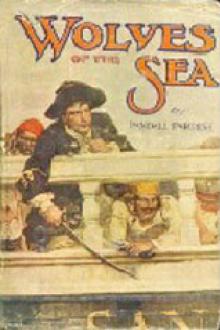Genre Other. Page - 316

!
Nevertheless, no one ever questioned the wealth of the Crudens, least of all did the Crudens themselves, who took it as much for granted as the atmosphere they breathed in.
On the day on which our story opens Mr Cruden had driven down into the City on business. No one knew exactly what the business was, for he kept such matters to himself. It was an ordinary expedition, which consisted usually of half a dozen calls on half a dozen stockbrokers or secretaries of companies, with perhaps an occasional visit to the family lawyer or the family bank.
To-day, however, it had consisted of but one visit, and that was to the bank. And it was whilst returning thence that Mr Cruden was suddenly seized with the stroke which ended in his death. Had immediate assistance been at hand the calamity might have been averted, but neither the coachman nor footman was aware of what had happened till the carriage was some distance on its homeward journey, and a passer-by caught sight of the senseless figure wi

"Places where many people live close together."
"Oh," said the girl frowning. "No. There are no cities here."
"Then where are the people of Paracosma? You must have neighbors."
The girl looked puzzled. "A man and a woman live off there," she said, gesturing toward a distant blue range of hills dim on the horizon. "Far away over there. I went there once, but Leucon and I prefer the valley."
"But Galatea!" protested Dan. "Are you and Leucon alone in this valley? Where--what happened to your parents--your father and mother?"
"They went away. That way--toward the sunrise. They'll return some day."
"And if they don't?"
"Why, foolish one! What could hinder them?"
"Wild beasts," said Dan. "Poisonous insects, disease, flood, storm, lawless people, death!"
"I never heard those words," said Galatea. "There are no such things here." She sniffed contemptuously. "Lawless people!"
"Not--death?"
"What is death?"
"It's--" Dan pause

decision which admits of no alternatives, he can't move at all.
"As you can see, the Karna tried to give us several choices on each point, and they were all rigged. Until they backed down to a single point and proved that it wasn't rigged, Nordon couldn't possibly make up his mind. I drummed into him how important this was, and the more importance there is attached to his decisions, the more incapable he becomes of making them."
The Secretary nodded slowly. "What about Braynek?"
"Paranoid," said Malloy. "He thinks everyone is plotting against him. In this case, that's all to the good because the Karna are plotting against him. No matter what they put forth, Braynek is convinced that there's a trap in it somewhere, and he digs to find out what the trap is. Even if there isn't a trap, the Karna can't satisfy Braynek, because he's convinced that there has to be--somewhere. As a result, all his advice to Nordon, and all his questioning on the wildest possibilities,

x.
CHATS: lice.
CHATTY: lousy,
CHAUNT: a song; to chaunt is to sing; to throw off a rum chaunt, is to sing a good song.
CHEESE IT. The same as Stow it.
CHEESE THAT. See STOW THAT.
CHINA STREET: a cant name for Bow Street, Covent Garden.
CHIV: a knife; to chiv a person is to stab or cut him with a knife.
CHRISTEN: obliterating the name and number on the movement on a stolen watch; or the crest, cipher, etc., on articles of plate, and getting others engraved, so as to prevent their being identified, is termed having them bishop'd or christen'd.
CHUM: a fellow prisoner in a jail, hulk, etc.; so there are new chums and old chums, as they happen to have been a short or a long time in confinement.
CHURY: a knife.
CLEANED OUT: said of a gambler who has lost his last stake at play; also, of a flat who has been stript of all his money by a coalition of sharps.
CLOUT: a handkerchief of any kind.
CLOUTING: the practice of picking

"Order!" cried a merry-faced little man, who had brought his young daughter with him to see life, and who always modestly hid his face in his beer-mug after he had thus assisted the business.
"John Nightingale, William Thrush, Joseph Blackbird, Cecil Robin, and Thomas Linnet!" cried Friar Bacon.
"Here, sir!" and "Here, sir!" And Linnet, Robin, Blackbird, Thrush, and Nightingale, stood confessed.
We, the undersigned, declare, in effect, by this written paper, that each of us is responsible for the repayment of this pig-money by each of the other. "Sure you understand, Nightingale?"
"Ees, sur."
"Can you write your name, Nightingale?"
"Na, sur."
Nightingale's eye upon his name, as Friar Bacon wrote it, was a sight to consider in after years. Rather incredulous was Nightingale, with a hand at the corner of his mouth, and his head on one side, as to those drawings really meaning him. Doubtful was Nightingale whether any virtue had gone out of him in that committal t

on. Theshuffling of feet, the rattling of chains, the harsh voices of theguard, made it impossible to distinguish any words passing between thetwo. I could only watch them, quickly assured that I had likewiseattracted the girl's attention, and that her gaze occasionally soughtmine. Then the guards came to me, and, with my limbs freed of fetters,I was passed down the steep ladder into the semi-darkness betweendecks, where we were to be confined. The haunting memory of her faceaccompanied me below, already so clearly defined as to beunforgettable.
It proved a dismal, crowded hole in which we were quartered like somany cattle, it being merely a small space forward, hastily boxed offby rough lumber, the sides and ends built up into tiers of bunks, theonly ventilation and light furnished by the open hatch above. Theplace was clean enough, being newly fitted for the purpose, but wastotally devoid of furnishings, the only concession to comfort visiblewas a handful of fresh straw in each bunk. The m

reedom of its people.
[Illustration: My First Drunk]
Some of the slaves, like us, had kind and indulgent masters. These were lucky indeed, as their lot was somewhat improved over their less fortunate brothers, but even their lot was the same as that of the horse or cow of the present day. They were never allowed to get anything in the nature of education, as smart negroes were not in much demand at that time, and the reason was too apparent, education meant the death of the institution of slavery in this country, and so the slave owners took good care that their slaves got none of it.
Go and see the play of "Uncle Tom's Cabin," and you will see the black man's life as I saw it when a child. And Harriett Beecher Stowe, the black man's Saviour, well deserves the sacred shrine she holds, along with the great Lincoln, in the black man's heart.
CHAPTER II.
WAR. "THE REBELS AND YANKEES." I RAISE A REGIMENT TO FIGHT. DI

remember well the magic of that first romantic glance across acrowded ballroom, the guileless smile and downcast eyes thatinstantaneously made my heart skip a beat. I remember the soulstirring melody of Band of Gold and the lingering smell of peachesand the gentle winds against my ears on a pleasant summer night.Sequential Problem Solving is about memories and dreams, making themcome true, and keeping them alive.
Sequential Problem Solving is about becoming both a success and alifelong-learner. Problem solving has two aspects: physical problemsin a scientific environment and personal problems in a spiritual innerworld. This book uses well known classical literary selections asmodels for personal decision making and character development. Theseworks were chosen primarily due to their ready availability.
Part of the fun of sequential problem solving is mentally rewritingstories to have more favorable outcomes. We imagine favorableoutcomes naturally, but successful people do so in a

(United States Constitution, Article I, Section 8)
------------------------------------------------------------------------
Preface
This volume contains the text of title 17 of the *United States Code*,including all amendments enacted through the end of the second sessionof the 106th Congress in 2000. It includes the Copyright Act of 1976 andall subsequent amendments to copyright law; the Semiconductor ChipProtection Act of 1984, as amended; and the Vessel Hull DesignProtection Act, as amended. The Copyright Office is responsible forregistering claims under all three.
The United States copyright law is contained in chapters 1 through 8 and10 through 12 of title 17 of the *United States Code.* The Copyright Actof 1976, which provides the basic framework for the current copyrightlaw, was enacted on October 19, 1976 as Pub. L. No. 94-553, 90 Stat.2541. Listed below in chronological order of their enactment aresubsequent amendments to copyright law.
Chapters

such Romance, thrice refined of dross, as only he knows whohas wooed his Art with passion passing the love of woman.
Far away, above the acres of huddled roofs and chimney-pots, thestorm-mists thinned, lifting transiently; through them, gray, fairy-like,the towers of Westminster and the Houses of Parliament bulked monstrousand unreal, fading when again the fugitive dun vapors closed down upon thecity.
Nearer at hand the Shade of Care nudged Kirkwood's elbow, whisperingsubtly. Romance was indeed dead; the world was cold and cruel.
The gloom deepened.
In the cant of modern metaphysics, the moment was psychological.
There came a rapping at the door.
Kirkwood removed the pipe from between his teeth long enough to say "Comein!" pleasantly.
The knob was turned, the door opened. Kirkwood, turning on one heel, beheldhesitant upon the threshold a diminutive figure in the livery of the Plesspages.
"Mr. Kirkwood?"
Kirkwood nodded.
"Gentleman to see you, sir."
Kirkwood nodded ag